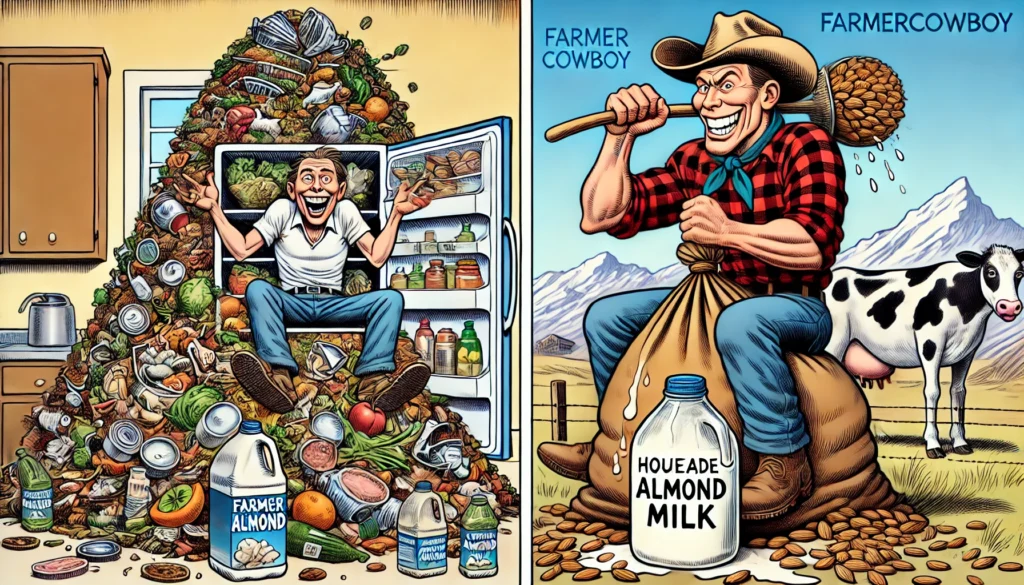
Sustainable Cooking A wide aspect satirical illustration in the style of FarmerCowboy.com with FarmerCowboy.com branding. Image 3 A person is seen composting a giant pile o4.webp.webp
Want to Eat Sustainably? Learn to Cook Something New—and Other Ways to Feel Superior at Dinner Parties!
Frying Up a Greener Future, One Quinoa-Filled Kale Leaf at a Time!
Cowpoke Junction, TX — Sustainability has never tasted so good—or so smug. If you’re tired of those pesky factory-farmed burgers clogging up your conscience, it’s time to expand your culinary horizons. Here are 15 educational observations to tickle your taste buds and tantalize your brain. Learn to cook sustainably, and you’ll not only save the planet—you’ll also impress everyone at your next dinner party. And isn’t that what really matters?
“The Earth provides from beneath our feet, and the wise gather what grows close, for the path to balance is not far from our door. The humble dandelion and bitter greens are gifts, though the tongue may stumble on strange words like quinoa or teff, the spirit understands their worth. Waste not, for what fills your table today becomes the nourishment of the soil tomorrow. The circle of life spins as we honor the land with every meal, knowing that even the smallest effort to sustain the Earth brings us closer to harmony.” Goes Hungary Most of the Time (Ancient Comanche Medicine Man)
The air was thick with the scent of freshly tilled soil and self-righteousness as a new wave of sustainable eating swept across this small farming town. Gone are the days of simple burgers and fried chicken; today’s culinary trendsetters are all about quinoa, kale, and the occasional cricket protein bar. But is this shift toward sustainability making a real difference, or is it just another way to feel superior at dinner parties?
“Local Sourcing” Just Means Using What’s in Your Backyard—Hope You Like Dandelion Salad!
Local sourcing has become the buzzword for anyone claiming to eat sustainably. In Cowpoke Junction, it translates to “I picked this from my yard five minutes ago.” Mary-Lou Jenkins, a local resident, proudly serves her guests dandelion salad straight from her garden. “I didn’t even have to go to the store!” she exclaims, unaware that her guests are politely pushing the greens to the edge of their plates.
According to sustainability expert Dr. Green, “Eating locally reduces carbon footprints, but only if you’re not stepping on your neighbor’s lawn to steal their herbs.”

If You Can’t Pronounce It, It Must Be Sustainable!
Remember when kale was exotic? Now, it’s all about quinoa, spirulina, and teff. Culinary expert Chef Pretentia explains, “The more syllables it has, the better it is for the environment. Plus, it’s fun to watch people struggle to say ‘amaranth’ correctly.”
One diner at the local organic eatery “Green Bliss” admitted, “I have no idea what half of this menu says, but I feel healthier just looking at it.”
Farm-to-Table? More Like Table-to-Compost.
The true mark of a sustainable eater is a compost bin larger than their refrigerator. Here in Cowpoke Junction, residents are turning their food scraps into compost with the fervor of a reality TV competition. “My compost is more diverse than the United Nations,” brags local farmer Jack Fertilizer. “I’ve got apple cores from three continents.”
Environmentalists argue that composting reduces waste, but with the amount of organic material being thrown away, one has to wonder: are we cooking just to feed our compost piles?

Eating Seasonally: The Art of Pretending You Love Squash in February
Eating seasonally is all fun and games until winter hits and you’re left with nothing but root vegetables. “I’ve eaten so much squash this month, I’m turning orange,” complains Tom Carrotson, a dedicated locavore. But experts insist that embracing the seasons is key to sustainable eating. “It’s about reconnecting with nature,” says food blogger Autumn Harvest. “Even if nature only gives you turnips.”
Plant-Based Everything—Because Apparently, Even Your Kitchen Counters Should Be Vegan
From vegan cheese to plant-based soap, the trend toward a plant-based lifestyle has reached absurd heights. Here in Cowpoke Junction, residents are taking it to the next level. “I’m even considering making my countertops out of recycled wood pulp,” confesses self-proclaimed eco-warrior Linda Leaf. “It’s like eating with the planet.”
Nothing Says “Green” Like Spending $12 on a Single Organic Avocado
The price of sustainable eating isn’t just measured in environmental impact—it’s also measured in dollars. At the Cowpoke Junction Farmer’s Market, shoppers are shelling out big bucks for organic produce. “Sure, it’s expensive,” says market vendor Organic Ollie, “but you can’t put a price on feeling better than everyone else.”
Cooking with Insects: Because Crunchy Crickets Are the New Kale Chips
If you’re serious about sustainability, it’s time to embrace entomophagy—the practice of eating insects. “Crickets are packed with protein and are way more eco-friendly than beef,” explains bug chef Ento Antman. But not everyone in Cowpoke Junction is on board. “I tried one of those cricket bars,” says local skeptic Bill Cowpoke, “and I’m still picking legs out of my teeth.”
Love Your Leftovers—Because Refrigerators Are Just Expensive Compost Bins
In the name of sustainability, leftovers have taken on a new role as “pre-compost.” Here in Cowpoke Junction, residents are turning their fridges into miniature compost heaps. “Why eat fresh when you can enjoy the challenge of identifying mystery meals from last week?” jokes local comedian Sally Spoiler.

DIY Nut Milks: Because Squeezing Almonds Is the New Pilates
Making your own nut milk has become a staple of sustainable living. “It’s a workout and a meal in one,” says nut milk enthusiast Almond Joy. “Plus, you’ll build serious arm muscles.” But for those new to the practice, the learning curve can be steep. “I tried making almond milk once,” says amateur chef Crushed Cashew. “Now I just use it as a doorstop.”
“Sustainable” Is Just a Fancy Word for “Takes Twice as Long to Cook”
Sustainability and convenience rarely go hand in hand. Here in Cowpoke Junction, residents are discovering that eco-friendly cooking often means spending hours in the kitchen. “I started making sourdough bread two days ago, and it still isn’t ready,” grumbles Betty Batter. But for true believers, the wait is worth it. “Sustainability is a journey, not a destination,” says slow food advocate Timmy Thyme.
Cooking Without Electricity: Welcome to the Joy of Hand-Crushed Ice Smoothies!
Living sustainably sometimes means sacrificing modern conveniences, like electricity. Here in Cowpoke Junction, residents are getting creative with their cooking methods. “I made a smoothie with hand-crushed ice today,” boasts off-grid guru Solar Sam. “It took me three hours, but I feel so connected to nature.”
Embrace “Ugly” Produce—Because Beauty Is Overrated in Carrots
Ugly produce is having a moment in Cowpoke Junction. Shoppers at the local co-op are snapping up misshapen vegetables with enthusiasm. “The uglier, the better,” says shopper Ugly Angie. “It’s like adopting a pet that no one else wants.” And while ugly produce may not win any beauty contests, it’s definitely winning hearts.
Waste Not, Want Not: Turning Beet Greens Into Artisanal Toilet Paper
Sustainability isn’t just about food—it’s a lifestyle. Here in Cowpoke Junction, residents are finding creative uses for everything, including beet greens. “I made toilet paper out of them,” says local innovator Recycled Randi. “It’s a little scratchy, but my conscience is clear.”
Cooking with Cast Iron—Because Who Needs Easy-to-Clean Non-Stick Pans?
Cast iron cookware has become a symbol of sustainable cooking. “It’s heavy, it’s tough, and it’s a pain to clean,” says cast iron enthusiast Iron Will. “But it’ll last forever—just like my memories of scrubbing it.” For those looking to build upper body strength, cast iron pans offer a double benefit: great food and a workout.
Mastering the Art of No-Cook Cooking: Ice Water Soup, Anyone?
On hot summer days, the last thing anyone wants to do is turn on the stove. Enter the world of no-cook cooking. “Ice water soup is a revelation,” says local minimalist Chilly Charlie. “It’s hydrating, cooling, and requires zero effort. Just add water.”
Step-by-step guides:
How to Embrace Sustainability on the Ranch—Without Starving to Death
- Find Creative Uses for Leftovers: If that beet green soup didn’t turn out, don’t despair. Just compost it, and pretend you’re feeding the earth.
- Try Out No-Cook Recipes: It’s not just for hipsters. No-cook cooking is great for those summer days when even the thought of turning on the oven makes you sweat. Ice water soup, anyone?
- Embrace the Ugly: Those misshapen vegetables might not look pretty, but they taste just as good as the supermodel produce.
- Slow Food Is Your Friend: Sure, it takes three days to make sourdough bread, but think of the sense of accomplishment!
- Invest in Cast Iron: Build up those muscles and enjoy the fruits of your labor—after scrubbing for an hour, of course.
Disclaimer:
Warning: This article is intended for entertainment purposes only. Any resemblance to actual sustainable living practices is purely coincidental. Please consult a real expert before turning beet greens into toilet paper.
15 Humorous Observations
- “Local Sourcing” Just Means Using What’s in Your Backyard—Hope You Like Dandelion Salad!
- Because nothing says “I care about the planet” quite like a meal that doubles as yard work.
- If You Can’t Pronounce It, It Must Be Sustainable!
- Quinoa, spirulina, and teff. The more your tongue trips, the greener your dish.
- Farm-to-Table? More Like Table-to-Compost.
- Embrace the circle of life by turning last night’s leftovers into tomorrow’s fertilizer.
- Eating Seasonally: The Art of Pretending You Love Squash in February.
- Winter blues got you down? Cheer up with yet another bowl of root vegetable stew!
- Plant-Based Everything—Because Apparently, Even Your Kitchen Counters Should Be Vegan.
- Did you know bamboo is both a sustainable material and a flavorless snack?
- Nothing Says “Green” Like Spending $12 on a Single Organic Avocado.
- Sure, your wallet is empty, but at least your conscience is full.
- Cooking with Insects: Because Crunchy Crickets Are the New Kale Chips.
- They’re sustainable, nutritious, and terrifyingly crunchy.
- Love Your Leftovers—Because Refrigerators Are Just Expensive Compost Bins.
- Who needs fresh food when you have a week-old mystery stew?
- DIY Nut Milks: Because Squeezing Almonds Is the New Pilates.
- Strengthen your core while you milk those nuts for all they’re worth.
- “Sustainable” Is Just a Fancy Word for “Takes Twice as Long to Cook.”
- Slow food isn’t just about quality; it’s about making sure you never have free time again.
- Cooking Without Electricity: Welcome to the Joy of Hand-Crushed Ice Smoothies!
- Who needs a blender when you have biceps and a baseball bat?
- Embrace “Ugly” Produce—Because Beauty Is Overrated in Carrots.
- The uglier the vegetable, the more you’ll feel superior while eating it.
- Waste Not, Want Not: Turning Beet Greens Into Artisanal Toilet Paper.
- Because even your bathroom breaks can be eco-friendly.
- Cooking with Cast Iron—Because Who Needs Easy-to-Clean Non-Stick Pans?
- Want to build upper body strength? Try scrubbing a cast iron skillet.
- Mastering the Art of No-Cook Cooking: Ice Water Soup, Anyone?
- Perfect for those scorching hot days when you care more about staying cool than actually eating.
Originally Published at FarmerCowboy.com
2024-08-27 17:50:14
Karl Hoffman is a distinguished agriculturalist with over four decades of experience in sustainable farming practices. He holds a Ph.D. in Agronomy from Cornell University and has made significant contributions as a professor at Iowa State University. Hoffman’s groundbreaking research on integrated pest management and soil health has revolutionized modern agriculture. As a respected farm journalist, his column “Field Notes with Karl Hoffman” and his blog “The Modern Farmer” provide insightful, practical advice to a global audience. Hoffman’s work with the USDA and the United Nations FAO has enhanced food security worldwide. His awards include the USDA’s Distinguished Service Award and the World Food Prize, reflecting his profound impact on agriculture and sustainability.








If you’ve got time to complain on the internet, you’ve got time to enjoy some Farm.FM music and change your mood.